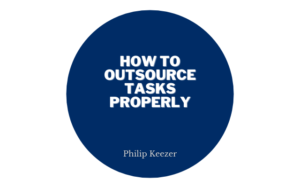Salary taxes, the infrastructure needed to accommodate a modern worker (even if they work remotely) and the responsibility you take on when hiring people. All of these can be a hurdle, especially when you’re just starting out with your business.
That’s why outsourcing tasks and responsibilities can be a great choice for some businesses. Although finding short-term contractors is easier than finding a long-term fit for your company, outsourcing still requires onboarding, measuring work quality, and ensuring a positive ROI on your contract.
That’s why today, I want to talk about outsourcing team members, and how to do it right.
The Benefits Of Outsourcing
As I mentioned above, there are a lot of benefits to outsourcing team members. You can end up getting a better deal on the work, there’s less pressure on employee infrastructure, and you can focus more on actually growing your business. However, there are way more benefits to outsourcing a team member.
For starters, there’s the expanded access to talent. When hiring, you need to match with a suitable candidate that likes your company, policies, position, salaries, benefits, and that has the willingness to work full-time for you. If you’re not hiring for a remote position, you also need to add geographical proximity to that list of requirements.
By comparison, when you outsource you have access to a large palette of people. Moreover, since contractors usually need to rely on their flawless service to get by, chances are that these people are also more talented, and can provide better results than the average employee. Of course, that’s not the case all the time, but you will find better prepared people when browsing for freelancers or agencies.
Besides, I think the biggest benefit of outsourcing is that you don’t need to do that much oversight. You simply settle on a list of deliverables and you analyze everything at the end of the month. It frees up a lot of time you’d spend coaching or onboarding to actually grow your business.
So why don’t we all forget about employees and only outsource specialists? Because there are downsides to outsourcing.
The Downsides Of Outsourcing
The first thing you’ll notice when you start working with a freelancer or an agency is that you don’t have as much flexibility as you’d have with an employee. You can’t rely on them to get back to you in a matter of minutes during working hours, and you can’t change a project drastically overnight.
Outsourcing team members is a bit more rigid. But that’s not the only downside. Besides offering flexibility, employees are more invested in your business, if you found the right candidate for your job. That’s why they’ll strive harder to see your business succeed, which in turn can lead to better results in the long run.
Lastly, outsourcing can sometimes be even more expensive than hiring someone. Yes, you don’t need to worry about paying taxes for your employees, but if you need to outsource a highly specialized freelancer, it can cost you way more than hiring a mid-level candidate and then training him over time to do as good of a job as any freelancer.
So you can see there are pros and cons to each approach. How do you know which one to choose?
Outsourcing vs Hiring
I think the easiest way to determine whether you should hire or outsource someone for a given position, or project you need to get done, is to look at the measurability of the task. Let me explain: If a task can be easily measured in hours, or any other metric, it’d be easier to outsource someone.
For example, content writing is something you can easily measure. Just look at the number of words, or articles output each month, and pay for that. It’s easy to outsource someone for content writing.
However, a project manager’s task might not be as easy to measure. They can be answering emails one hour, and then having calls for the rest of the day. It’s unpredictable. That’s why it’s better to hire people in management positions.
But measurability isn’t everything. You should also consider availability. A web developer isn’t something you need to get in contact with every day, so it’s not a problem that they’re not always available – you outsource their services to create the website, and then pay a small sum for maintenance each month.
In contrast, a sales specialist is someone you’d want a call away at any moment during the working day, because opportunities and complaints can crop up at any time.
Once you’ve given this some thought, and decided outsourcing team members is the right call for a given project, it’s time to find the right ones.
Finding And Vetting Contractors
After taking the decision to outsource team members, it’s time to set yourself some expectations. Whether you’re paying for a content writer, web developer, or SEO specialist, it’s important to do your own research and come up with a list of expectations, or even a mock-up of your desired result. Having that will speed up the process and bring clarity to outsourcing.
When you have some project expectations, you can find contractors in a lot of places online, including:
- Specialized job boards, like the Problogger board
- Remote-friendly classifieds websites, like Indeed, Weworkremotely, or Monster
- Linkedin, by browsing for the type of freelancer you’re looking for
After you have a list of contractors you’d like to work with, it’s not crucial to host an interview or any other test assignment like you would in a job application process (although it helps), but rather you want to vet contractors by paying them for a snippet of what their work would entail. So for example, if you want to hire a content writer that publishes 20 articles a month on your blog, pay them for a test article to see if you’d be good together.
After that, you can make an informed decision as to whether or not you want to shake hands and sign a contract for a longer period of time. Just make sure that you work with legal advisors to draft a comprehensive contract, encompassing everything you agreed with the contractor.
In Conclusion
Outsourcing team members is not always the right call. If you need someone dependable, flexible and willing to give your company everything they got, an employee is better.
However, if your project is easily measurable, and you have the budget for it, outsourcing can help you achieve more, as long as you find the right people to work with.
What’s your experience with contractors? I’d love to hear your stories in the comments section below!














